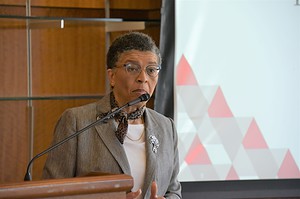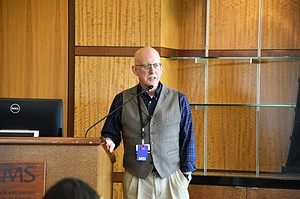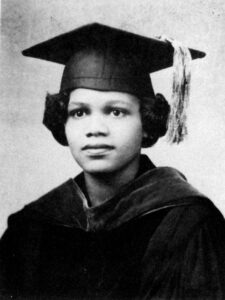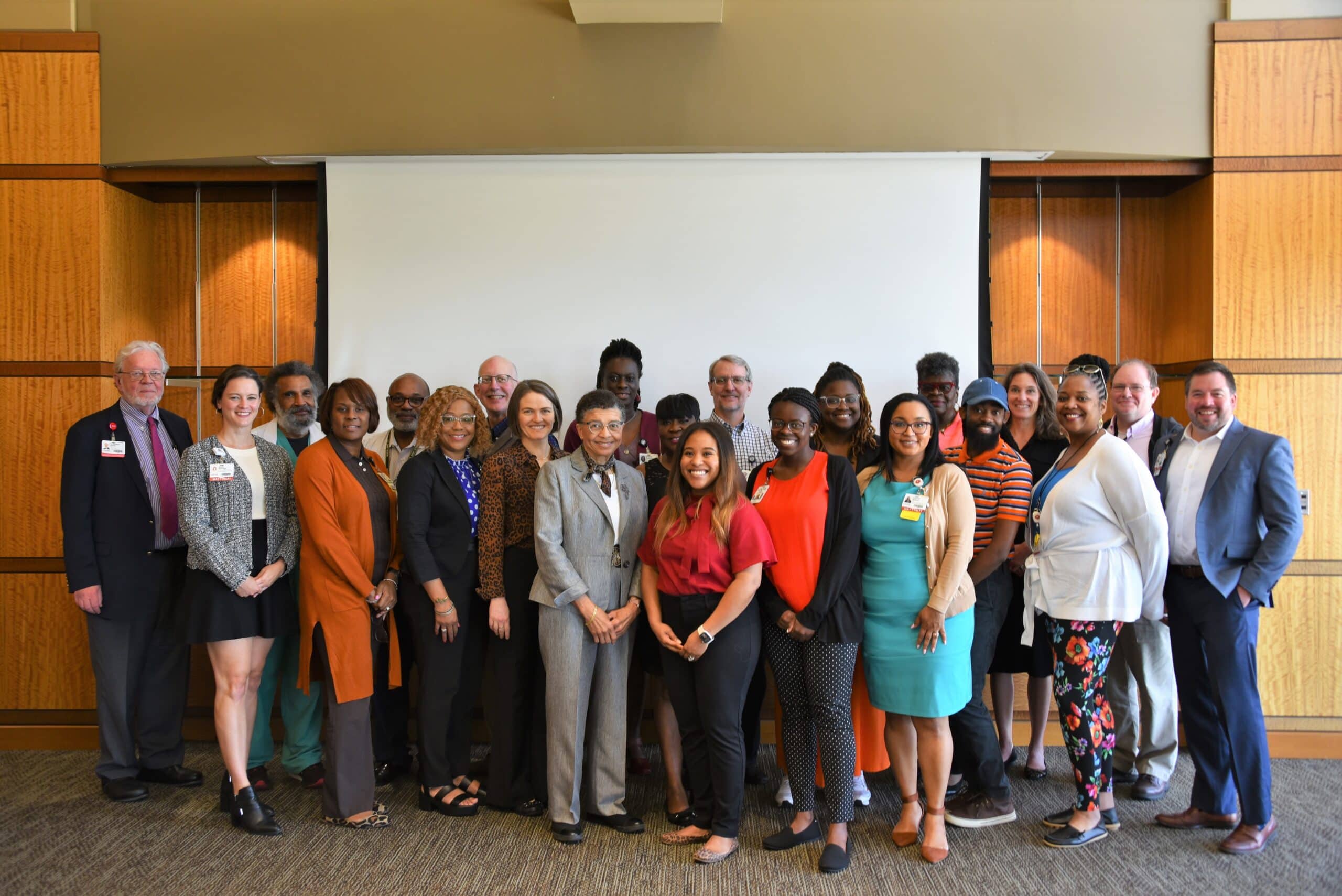View Larger Image
Guests celebrated the life and legacy of Edith Irby Jones, M.D., and enjoyed an inspiring lecture by Jeannette E. South-Paul, M.D., FAAFP.
Image by Andrew Vogler
| A celebration for the enduring legacy of Edith Irby Jones, M.D., and the scholarship that she inspired was held April 19. The event also provided an opportunity to acknowledge the growth of the Edith Irby Jones, M.D. Endowed Scholarship, and the University of Arkansas for Medical Sciences (UAMS) College of Medicine students that have benefited from it.
Jones enrolled in UAMS in 1948 as the first African American student in the South to attend a previously all-white medical college. She would go on to graduate from UAMS in 1952.
“Today is a day for gratitude, and I am certainly grateful for all the people who have contributed to scholarships at UAMS, especially the scholarship honoring Dr. Edith Irby Jones,” said G. Richard Smith, M.D., a distinguished professor of psychiatry, and the interim dean of the College of Medicine and UAMS executive vice chancellor. “We have been fortunate to have many outstanding African American students graduate from the College of Medicine, and we owe a debt of gratitude to Dr. Jones for blazing that trail.”
Retired Army Maj. Gen. Elder Granger, M.D., a distinguished UAMS alumnus and member of the Board of Advisors, and his wife Brenda W. Granger, created the Edith Irby Jones, M.D. Endowed Scholarship to honor the life and legacy of Jones. The inaugural scholarship was awarded in 2018 to celebrate the 70th anniversary of Jones’ matriculation to UAMS.
In 2022, Bill Ventres, M.D., UAMS College of Medicine faculty member, and the Ben Saltzman, M.D., Distinguished Chair in Rural Family Medicine, made a significant contribution to encoruage others to make impactful contributions to the fund.

Much of Jeannette E. South-Paul’s lecture explored the power of philanthropy.Andrew Vogler
Jeannette E. South-Paul, M.D., FAAFP, chair of the Department of Family Medicine at the University of Pittsburgh School of Medicine, gave remarks at the event and highlighted the importance of scholarships for students.
“Philanthropy comes in a lot of different ways. I have benefited from people sharing their time, love, support, expertise, money — now I am in a capacity where I can help others as well,” said South-Paul. “We want everyone to see that developmental process in our communities so that we can give to others. We owe this to our students because they can’t be what they can’t see.”
A pioneer in the desegregation of higher education in Arkansas and the South, Jones had a distinguished career as a doctor, educator and philanthropist.
“Among other achievements, the UAMS College of Medicine is known around the United States as the first public institution in the South to admit a person of color to its student body — Edith Irby Jones,” said Ventres. “Honoring this historic milestone and Dr. Jones is important, but let us not forget that time moves only in one direction. As we move forward in time, as members of the UAMS community let us continue the hard work of fulfilling our institutional vision statement, ‘for a better state of health.’ The people in Arkansas — all people in Arkansas — deserve no less.”
Jones was born near Conway, Arkansas, in 1927. Her father and her older sister died largely due to her impoverished family’s lack of access to medical attention. When Jones was 7, she suffered a bout of rheumatic fever that prevented her from walking and kept her from attending school for a year. However, it was her family’s unfortunate experiences that motivated Jones to pursue a career in medicine.

Bill Ventres, M.D., talked about the importance of Edith Irby Jones’ enduring legacy and why she is important to UAMS and Arkansas.Andrew Vogler
Jones was born near Conway, Arkansas, in 1927. Her father and her older sister died largely due to her impoverished family’s lack of access to medical attention. When Jones was 7, she suffered a bout of rheumatic fever that prevented her from walking and kept her from attending school for a year. However, it was her family’s unfortunate experiences that motivated Jones to pursue a career in medicine.
Jones and her mother eventually moved to Hot Springs, Arkansas, where she had access to better educational opportunities. She excelled academically, graduating with honors from her high school. She attended Knoxville College, a historically black college in Knoxville, Tennessee, and graduated cum laude, earning a Bachelor of Science in chemistry and minors in biology and physics.
On pursing acceptance into medical school, Jones applied to three schools: two in Chicago — Northwestern University and the University of Chicago, which had been admitting African American students for many years — and UAMS, which did not admit Black students due to the state’s segregationist policies. She was accepted by all three schools, but she chose UAMS because the tuition was considerably less.

Edith Irby Jones, M.D., enrolled in UAMS in 1948 and graduated in 1952.
That year, Jones ranked 28th out of 230 UAMS applicants. After much campaigning by Jones’ supporters, H. Clay Chenault, M.D., then-dean of the College of Medicine, made the decision to desegregate medical education and accept her into UAMS. The University of Arkansas Board of Trustees voted to increase the class size by one so that it could not be said by those who opposed the decision that Jones was somehow “taking a spot” from a white person.
During her time at UAMS, Jones faced many hardships, including death threats and intimidation. She was also not allowed to use the same dining, lodging or bathroom facilities as other students. However, many of her classmates ignored these policies and treated her like the rest of the students, choosing to dine and study with her.
After graduation, Jones opened a general practice in Hot Springs before moving to Houston, Texas, becoming the first African American woman intern at a Baylor College of Medicine Affiliated Hospital. In 1985, Jones was elected the first female president of the National Medical Association. She also was the only female founding member of the Association of Black Cardiologists. Jones continued teaching and practicing medicine at the University of Texas Medical School and the Baylor College of Medicine until 2014.
“Throughout her career, Dr. Jones’ mission was always to correct health care disparities and she often visited countries, such as Haiti and Cuba, where medical care was difficult to receive,” said Tim Nutt, director of UAMS Historical Research Center. “Dr. Edith Irby Jones died in 2019, leaving behind a legacy of compassion for those less fortunate, encouragement, advocacy and hope.”
Credit:Source link



